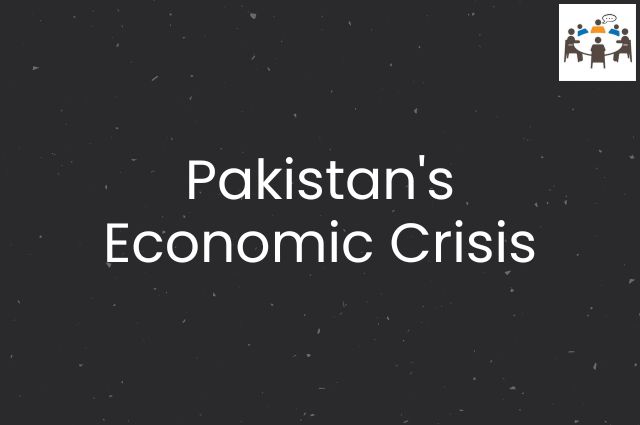Theme:
- The global rating agency Fitch recently downgraded Pakistan’s sovereign credit rating from CCC+ to CCC-, indicating high financial risks for investors. This is the second time Fitch has downgraded Pakistan’s sovereign rating since October 2022. This will make it harder for Pakistan to get investments, which it desperately needs right now.
Issues:
- High debt: Pakistan’s debt-to-GDP ratio is 77.8%, or around $293 billion, which is very high, and the debt is likely to continue to increase in the future.
- Lack of reforms: The government of Pakistan has failed to implement reforms due to a lack of regulatory oversight and enforcement, as well as weak financial management due to high levels of corruption in the system. This has led to a decrease in domestic productivity and economic growth.
- Political instability: It is no secret that the military of Pakistan holds the real power there, which has resulted in frequent military interventions in the democratic system of the country. Due to this, we are witnessing increasing protests and social unrest throughout the country.
- Economic issue: Pakistan was suffering from slow economic growth post-COVID pandemic, which just became worse during the pandemic and later due to catastrophic flooding. It is now suffering from high inflation of 27.6% due to high debt, political instability, the fall of its currency, and low foreign reserves of $4.3 billion. Due to all these issues, it is very likely that Pakistan will default on its debt, just like Sri Lanka.
- Terrorism: In recent times, Pakistan has seen a spike in terrorist attacks on its soil from the Pakistan Taliban, or TTP terrorist group, which is hurting Pakistan more at a time when it is going through a political and economic crisis.
Impact on India:
- Pakistan is home to many terrorist groups, which creates the possibility that if Pakistan becomes unstable or falls into chaos, there is the potential for increased cross-border terrorism, with Pakistan-based militant groups increasingly targeting India.
- If Pakistan’s economic situation fails to improve, it could result in many refugees entering India, either through legal or illegal means. This influx of refugees may create additional security challenges for our security forces.
- The weakening of Pakistan’s economy will also mean an even greater increase in the influence of China in Pakistan, which can result in a challenge for India.
- Pakistan is a nuclear-armed country, due to which there is always a threat of militant groups getting their hands on nuclear weapons if its government collapses.
Potential Solutions:
- The government of Pakistan should prioritise improving regulatory oversight and enforcement and addressing corruption in the system.
- The Pakistani government will have to increase transparency and accountability in its political system and reduce military intervention in the democratic process. This will be very difficult because the Pakistani military is not willing to let go of its power over the system.
- Pakistan ranked 107th out of 140 countries in the Global Competitiveness Index of 2018, and it is now even worse after the COVID pandemic. Pakistan will have to implement economic reforms aimed at increasing domestic productivity and economic growth to focus on building its domestic industry and expanding its exports to attract foreign investments.
- Pakistan will need to work on combating terrorism and extremist groups in the country, which could help improve stability in the country and attract foreign investment. It will also bring peace to the region and reduce the risk of a nuclear attack.
- Pakistan will have to make attempts to normalise its relations with India. This is not only good for Pakistan’s economy, but it will also be good for the growth of the entire region.
Conclusion:
It is likely that Pakistan will not be able to manage its debt crisis and will eventually default on its debt due to its political instability, corruption, and weak institutions, which have made it difficult for the government to implement the necessary economic reforms to address the country’s debt crisis. When this happens, it will bring a state of economic crisis to the country, which will suffer from major currency devaluation, very high inflation, and increasing social and political instability. The potential for increased cross-border terrorism and the risk of nuclear weapons falling into the wrong hands also adds to the gravity of the situation. One thing is clear: if Pakistan’s government does not take proactive measures, the average citizen will face a difficult future.
Your Turn…
What’s your take on this topic? Express your point of view through the comment section below. And subscribe to our blog to read answers to the trending GD topics.
Copyright @ Group Discussion Ideas.

